-
 Bitcoin
Bitcoin $121,713.8152
3.06% -
 Ethereum
Ethereum $3,041.6437
2.42% -
 XRP
XRP $2.9499
5.12% -
 Tether USDt
Tether USDt $1.0000
-0.02% -
 BNB
BNB $704.1034
1.75% -
 Solana
Solana $166.7523
2.91% -
 USDC
USDC $0.9999
0.00% -
 Dogecoin
Dogecoin $0.2052
2.90% -
 TRON
TRON $0.3011
-0.47% -
 Cardano
Cardano $0.7461
1.42% -
 Hyperliquid
Hyperliquid $48.3650
1.12% -
 Stellar
Stellar $0.4548
3.52% -
 Sui
Sui $3.9527
14.50% -
 Chainlink
Chainlink $16.3300
5.87% -
 Bitcoin Cash
Bitcoin Cash $511.8016
1.25% -
 Hedera
Hedera $0.2395
1.40% -
 Avalanche
Avalanche $21.6526
2.06% -
 UNUS SED LEO
UNUS SED LEO $9.0073
-0.23% -
 Shiba Inu
Shiba Inu $0.0...01369
2.61% -
 Toncoin
Toncoin $3.0335
0.66% -
 Litecoin
Litecoin $96.6206
1.72% -
 Monero
Monero $355.1673
5.35% -
 Polkadot
Polkadot $4.0839
2.47% -
 Uniswap
Uniswap $9.3282
9.72% -
 Dai
Dai $0.9997
-0.01% -
 Ethena USDe
Ethena USDe $1.0004
-0.04% -
 Pepe
Pepe $0.0...01248
1.07% -
 Bitget Token
Bitget Token $4.4642
2.68% -
 Aave
Aave $325.0626
6.81% -
 Bittensor
Bittensor $418.1482
6.22%
How to calculate the break-even electricity rate for Bitcoin mining?
The break-even electricity rate in Bitcoin mining is the maximum cost per kWh a miner can pay without losing money, calculated using hashrate, power consumption, Bitcoin price, and network difficulty.
Jul 14, 2025 at 10:42 pm
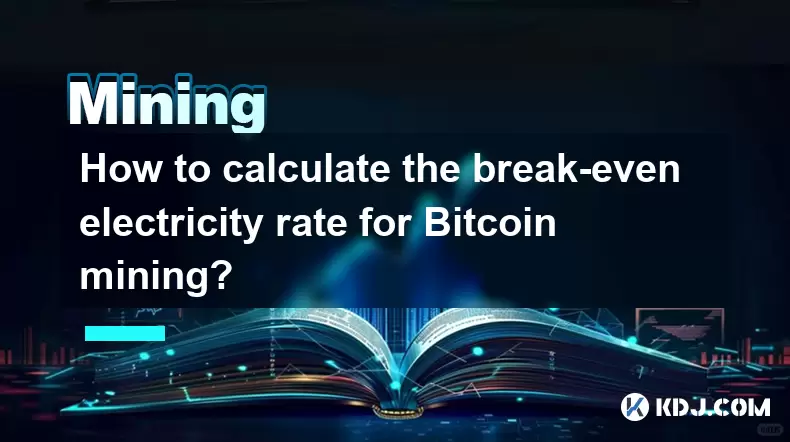
Understanding the Break-Even Electricity Rate
In Bitcoin mining, break-even electricity rate refers to the maximum amount a miner can pay per kilowatt-hour (kWh) without incurring losses. This calculation is crucial for miners who want to ensure profitability or at least avoid financial loss over time. The break-even point depends on several factors including the hashrate of the mining equipment, Bitcoin price, network difficulty, and block rewards.
To calculate this metric accurately, it's essential to gather real-time data and understand how each variable influences profitability. A small fluctuation in any of these variables can significantly impact the final outcome.
Key Components Involved in the Calculation
Before diving into the formula, it’s important to identify all the elements involved:
- Hashrate (H): Measured in terahashes per second (TH/s), this indicates how powerful your mining hardware is.
- Power Consumption (W): Measured in watts, this shows how much energy the miner uses per hour.
- Block Reward (BR): Currently set at 6.25 BTC per block (subject to halving events).
- Network Difficulty (D): A dynamic value that adjusts every 2016 blocks to maintain a consistent block time.
- Bitcoin Price (P): The current market value of one Bitcoin in USD or another fiat currency.
- Pool Fees (F): Some mining pools charge a percentage fee for their services.
Each of these values must be known or estimated before performing the actual calculation.
The Mathematical Formula for Break-Even Electricity Rate
The general formula used to calculate the break-even electricity rate (EER) is:
EER = (Daily Revenue in USD) / (Daily Power Consumption in kWh)
Where:
- Daily Revenue in USD = (H × BR × P × 86400) / (D × 2^32)
- Daily Power Consumption in kWh = W × 24 / 1000
Let’s break down each part step by step:
Calculate the expected number of bitcoins mined per day using your hashrate:
- BTC per Day = (H × BR × 86400) / (D × 2^32)
Multiply that by the current price of Bitcoin to get daily revenue in USD:
- Daily Revenue = BTC per Day × P
Compute the total power consumption in kilowatt-hours per day:
- kWh per Day = (W × 24) / 1000
Finally, divide the daily revenue by the daily power consumption to get the break-even electricity rate:
- EER = Daily Revenue / kWh per Day
This gives you the maximum electricity cost per kWh you can afford while staying profitable.
Gathering Real-Time Data for Accurate Results
Accurate calculations require up-to-date information:
- Hashrate: Check your mining rig specifications or pool dashboard.
- Power Consumption: Use a wattmeter or refer to manufacturer specs.
- Bitcoin Price: Obtain from a reliable exchange or tracking service.
- Network Difficulty: Found on platforms like Blockchain.com or mining calculators.
- Block Reward: Monitor Bitcoin halving schedules.
- Mining Pool Fees: Review the terms of your chosen mining pool.
Some tools automatically fetch live data, but manual entry ensures transparency and control. Always double-check numbers before proceeding with calculations.
Practical Example Using Sample Values
Let’s assume the following values for a practical example:
- Hashrate (H) = 100 TH/s
- Power Consumption (W) = 3000 watts
- Bitcoin Price (P) = $30,000
- Network Difficulty (D) = 25,000,000,000,000
- Block Reward (BR) = 6.25 BTC
- Pool Fee (F) = 1%
First, calculate BTC per Day:
- BTC per Day = (100 × 10^12 × 6.25 × 86400) / (25,000,000,000,000 × 2^32)
- Simplify and compute this value.
Next, calculate Daily Revenue:
- Multiply BTC per Day by $30,000.
Then, calculate kWh per Day:
- (3000 × 24) / 1000 = 72 kWh/day
Finally, compute EER:
- Divide daily revenue by 72 to find the break-even electricity rate in USD per kWh.
This example illustrates how changing any variable impacts the final result. Even a small change in difficulty or Bitcoin price alters the EER dramatically.
Frequently Asked Questions
Q1: How often should I recalculate my break-even electricity rate?
It’s recommended to recalculate at least once a week due to fluctuations in Bitcoin price and network difficulty. More frequent recalculations may be necessary during volatile periods.
Q2: Can I use this formula for other cryptocurrencies like Ethereum or Litecoin?
Yes, the formula can be adapted by replacing Bitcoin-specific values with those of the target cryptocurrency. Ensure you use the correct block reward, difficulty, and market price for accurate results.
Q3: What happens if my electricity rate exceeds the break-even rate?
If your actual electricity cost per kWh is higher than the calculated EER, mining becomes unprofitable. You may need to upgrade hardware, reduce power usage, or seek cheaper electricity sources to remain viable.
Q4: Are there online tools that automate this calculation?
Yes, several mining calculators such as WhatToMine or CryptoCompare Mining Calculator offer automated EER calculations. However, understanding the underlying formula helps verify accuracy and troubleshoot discrepancies.
Disclaimer:info@kdj.com
The information provided is not trading advice. kdj.com does not assume any responsibility for any investments made based on the information provided in this article. Cryptocurrencies are highly volatile and it is highly recommended that you invest with caution after thorough research!
If you believe that the content used on this website infringes your copyright, please contact us immediately (info@kdj.com) and we will delete it promptly.
- MoonBull, Crypto Race, Melania Hype: Decoding the Meme Coin Mania
- 2025-07-15 02:30:12
- Southeast Asia: Deep Incubation Fuels Investment Boom
- 2025-07-15 02:30:12
- MANTRA, Google Cloud, and the $OM Surge: What's Driving the RWA Revolution?
- 2025-07-15 02:35:12
- XRP's Wild Ride: Implied Volatility and Potential Price Swings
- 2025-07-15 01:10:12
- Altcoin Companies Launch: HYPE's Bold Nasdaq Move & Promising Altcoins to Watch
- 2025-07-15 01:50:12
- Crypto, Ethereum, Tokens: What's Hot in the NYC Crypto Scene?
- 2025-07-15 01:55:13
Related knowledge
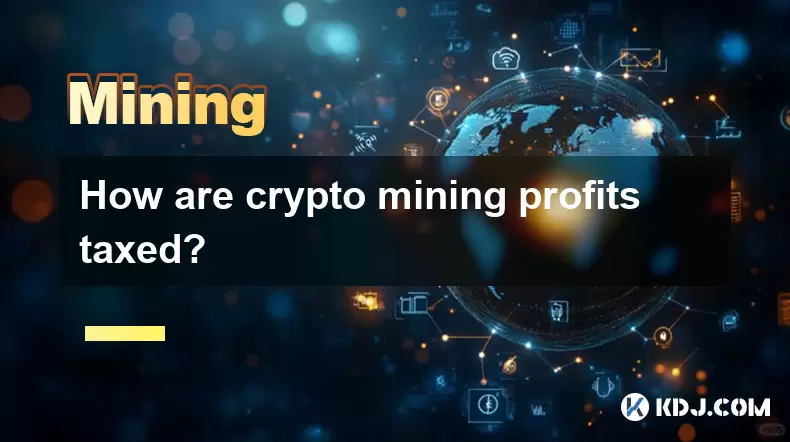
How are crypto mining profits taxed?
Jul 14,2025 at 12:28am
Understanding Cryptocurrency Mining and TaxationCryptocurrency mining involves validating transactions on a blockchain network and earning rewards in ...
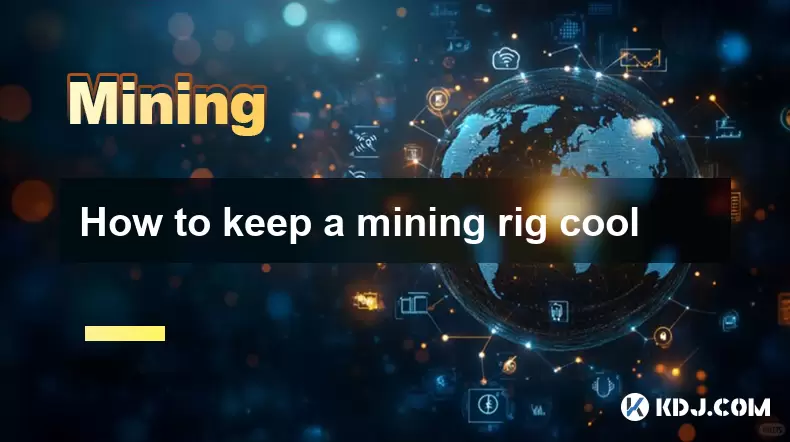
How to keep a mining rig cool
Jul 12,2025 at 01:42pm
Understanding the Importance of Cooling in Mining RigsCryptocurrency mining is an intensive process that places heavy demand on hardware components, p...

How much does it cost to start crypto mining?
Jul 13,2025 at 12:22am
Understanding the Basic Costs of Crypto MiningStarting crypto mining involves several upfront and ongoing expenses. The primary costs include hardware...
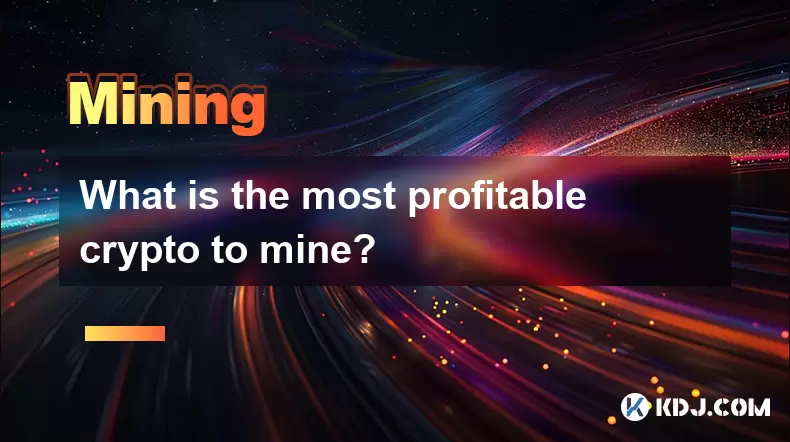
What is the most profitable crypto to mine?
Jul 13,2025 at 07:00am
Understanding Mining Profitability in CryptocurrencyWhen evaluating the most profitable crypto to mine, it's essential to consider several factors tha...
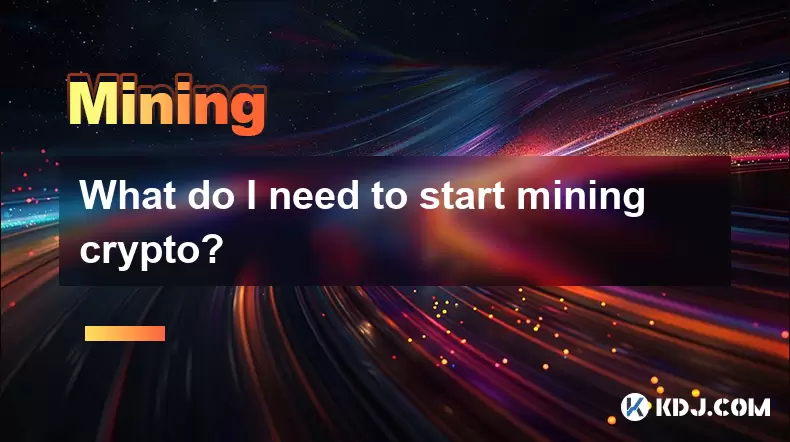
What do I need to start mining crypto?
Jul 13,2025 at 12:28am
Understanding the Basics of Crypto MiningCrypto mining is the process by which transactions are verified and added to a blockchain, and new coins are ...
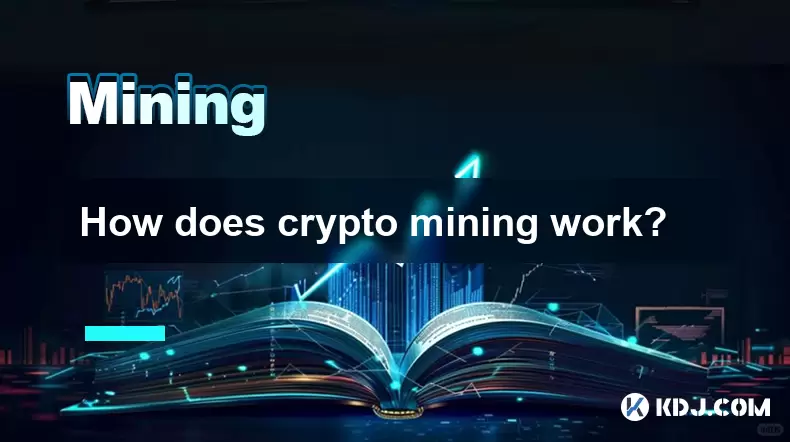
How does crypto mining work?
Jul 13,2025 at 11:01am
Understanding the Basics of Crypto MiningCrypto mining is the process through which new cryptocurrency coins are introduced into circulation and trans...

How are crypto mining profits taxed?
Jul 14,2025 at 12:28am
Understanding Cryptocurrency Mining and TaxationCryptocurrency mining involves validating transactions on a blockchain network and earning rewards in ...

How to keep a mining rig cool
Jul 12,2025 at 01:42pm
Understanding the Importance of Cooling in Mining RigsCryptocurrency mining is an intensive process that places heavy demand on hardware components, p...

How much does it cost to start crypto mining?
Jul 13,2025 at 12:22am
Understanding the Basic Costs of Crypto MiningStarting crypto mining involves several upfront and ongoing expenses. The primary costs include hardware...

What is the most profitable crypto to mine?
Jul 13,2025 at 07:00am
Understanding Mining Profitability in CryptocurrencyWhen evaluating the most profitable crypto to mine, it's essential to consider several factors tha...

What do I need to start mining crypto?
Jul 13,2025 at 12:28am
Understanding the Basics of Crypto MiningCrypto mining is the process by which transactions are verified and added to a blockchain, and new coins are ...

How does crypto mining work?
Jul 13,2025 at 11:01am
Understanding the Basics of Crypto MiningCrypto mining is the process through which new cryptocurrency coins are introduced into circulation and trans...
See all articles

























































































